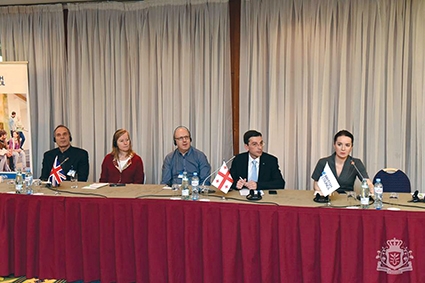British Council Hosts Inclusion and Special Educational Needs Forum
A two-day forum on Inclusion and Special Educational Needs (SEN) in Georgia was organized on the initiative of the Ministry of Education and Science of Georgia and British Council in Georgia on March 12-13. For this purpose, British experts visited the capital of Georgia and, together with local specialists and representatives of the schools, discussed the existing problems and important aspects of inclusive education.
Georgia signed a global convention in 2014 and is now obliged to create equal conditions and opportunities for education. “We have already achieved some results in this field, having begun to deal with infrastructure and teacher training issues, though we are still at the initial stage of development,” said Minister of Education and Science of Georgia, Tamar Sanikidze. “This area requires constant updating of knowledge, which is why this visit of our foreign guests is so important for us,” she stated.
During the first day of the event, plenary speakers and Forum participants talked about the SEN policy in Georgia, how inclusive learning is supported at the government level and what has been done so far. They also overviewed the challenges they are facing and what needs to be changed in the future. Two state school teachers gave a first-hand classroom perspective; and the British plenary speaker provided a framework for inclusion based on 10 approaches. In addition, plenary speakers presented the UK policy and practice in SEN and the importance of high quality teaching and learning for everyone.
“We have to understand that inclusive education concerns not only the medical sphere. First of all, it is an important part of education in general. For that, teachers must have the appropriate knowledge and skills to teach these children,” said Phil Dexter, English Language Teacher and Development Adviser for the British Council, UK.
The British Council stated that the ideal scenario is an integrated school approach where there is a whole school policy in support of SEN, which begins at school leadership level. Co-ordination between professionals (educational psychologists, speech therapists, behavior management specialists, etc.) and teachers is an essential ingredient for success.
“Creating equal conditions is the most important value for the British Council. Society must adapt to the needs of individuals and schools have a huge role in it,” said Zaza Purtseladze, Director of the British Council in Georgia. “During the Forum, participants had an opportunity to get to know local and foreign practices, and also to participate in the workshops by our invited experts during the second day.”
The Forum hosted 120 state school teachers, school principals, heads of resource centers from Tbilisi and regions of Georgia, and representatives of various organizations involved in supporting inclusive learning. The foreign experts highlighted the importance of taking part in the Forum and sharing experience. “Several Georgian teachers have already visited the UK and discovered our methods of inclusive education. So, today I am glad to be here and see such a great interest in this field,” said David Crabtree, an education expert.
Eka Karsaulidze












